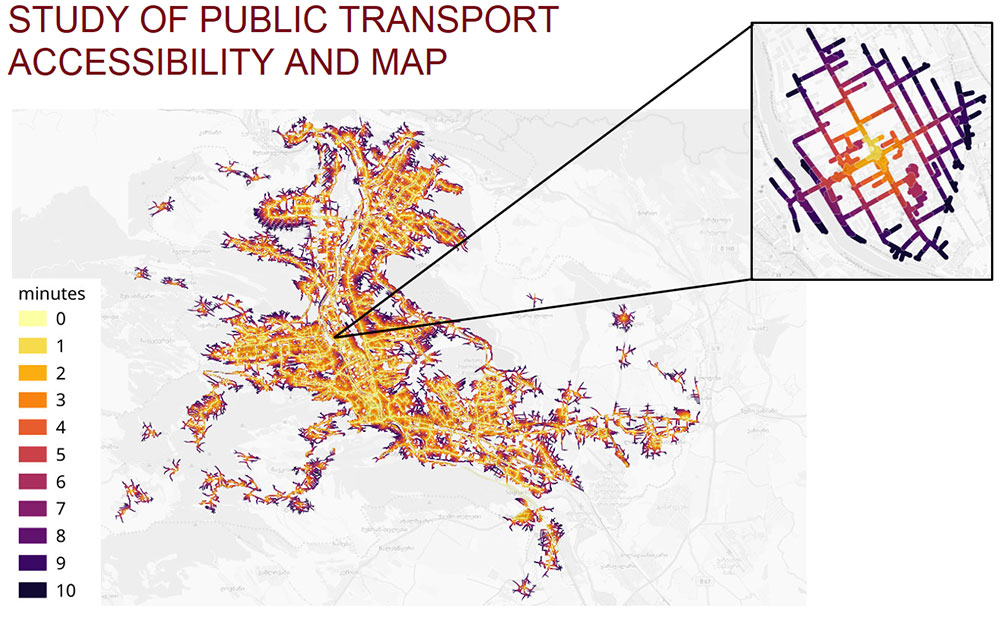From 1990 to 2015, urban population in Asia and the Pacific Region doubled within this period and grew faster than any other region. Between 2015 and 2050, Asia’s cities are expected to rise from 50% to about 65% of its total population, which will rise from 2.1 billion to 3.3 billion people. While this presents opportunities for higher productivity and better living standards, there are several risks – so integrated urban planning is needed. To engage selected cities in an integrated approach towards becoming more livable, the Asian Development Bank (ADB) established the Future Cities Program (FCP) in the Asia and Pacific Region. [1] [2]
One of these selected cities is Tbilisi, the capital of Georgia. The physical features of the city give it a picturesque look and unique character. The same features, however, have become a challenge for the city’s mobility. The hilly nature of Tbilisi, along with the poor quality of its public transport, high road congestion, unregulated taxis, and cheap parking impede its shift to sustainable urban mobility.
Building on the initial transport system assessment conducted by the Austrian Institute of Technology (AIT) for the City of Tbilisi in 2017, further gaps in urban transport planning and operations management as well as local capacity building of City Hall staff were highlighted by AIT in 2018. Hence, Tbilisi is looking at developing information and communications (ICT) based tools to help manage the city’s transport system, and to develop its capacity on the use of these tools.
The Asian Development Bank (ADB) has designated AIT as a “knowledge partner” for purposes of fostering knowledge sharing and enhancing the delivery of knowledge outputs under ADB-administered technical assistance, grants and loan projects. The agreed joint work program for 2018 under the ADB/AIT Knowledge Partnership Agreement (KPA) developed a methodology for mobility related impact assessment and guidelines for transport planning in the construction permit process in Tbilisi.
Based on the main issues of Tbilisi’s Transport Department identified during the Inception Phase of the project, the study focus has been defined in close cooperation with ADB which has led to the following feasible items as part of the work plan for the Implementation Phase of the project:
- Survey of road infrastructure and road scheme of study area
- Study of public transport accessibility and map
- Number of residents/visitors within the proposed development and total number of generated/attracted trips
- Impact assessment of new generated trips
Isochrones for identifying the walkable catchment areas of different public transport stops across the city
This project developed and evaluated a specific methodology for the impact assessment of mobility related aspects, thus supporting the decision making regarding the approval of new development projects in the City of Tbilisi. It is based on state-of-the-art guidelines from best practices which were identified in a comprehensive desk research. The implementation of the transport assessment methodology is tailored to the specific requirements of Tbilisi City Hall and includes the definition of data and formats, a structured methodological approach and strategies to ensure transparent and high-quality planning standards in the assessment. As such, the planning processes across departments in the City Hall benefit from this improvements and planning can be done in a more efficient way.
Emphasis was also put on the capacity building and training of City Hall staff where AIT experts have been working hand in hand with City Hall staff to make improvements. The developed transport assessment methodology was translated into Georgian during its implementation and has been evaluated and refined in multiple stages in close cooperation with Tbilisi City Hall.
[1] Asian Development Bank: Establishing the Future Cities Program in the Asia and Pacific Region, Project Number: 49053-001, Technical Assistance Report, December 2015 (https://www.adb.org/sites/default/files/project-document/178245/49053-001-tar.pdf)
[2] United Nations, Department of Economic and Social Affairs, Population Divison; www.un.org/en/development/desa/ population/publications/database/index.shtml
Acknowledgement:
All the work within this project was done in close cooperation with the Asian Development Bank, Tbilisi Municipality and the Cities Development Initiative for Asia under the Knowledge Partnership Agreement between AIT and ADB, financed by TA 8559-REG: Supporting the Cities Development Initiative for Asia.





